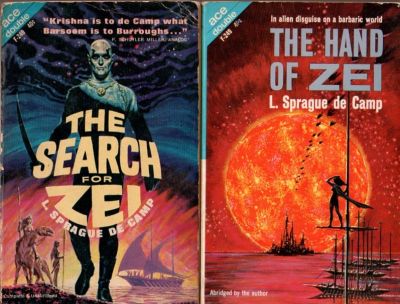Couriers de Bois Are We
The Search for Zei / The Hand of Zei (Krishna, volume 3)
By L. Sprague de Camp

5 Jan, 2020
L. Sprague de Camp’s 1963 The Search for Zei / The Hand of Zei is the Ace Double edition of the second book in de Camp’s Krishna planetary adventure series.
Krishna! Exotic planet of adventure! A place that has little day-to-day relevance to ghostwriter Dirk Barnevelt, living as he does a life of quiet oppression under the iron rule of his mother on Earth, twelve light-years away. The closest Barnevelt gets to adventure is writing up the exploits of interplanetary explorer Igor Shtain.
Then Shtain vanishes.
(On the one hand, spoilers; on the other, this book is ancient.)
Shtain’s inexplicable disappearance puts his associates in an awkward spot. Shtain was to have travelled to Krishna’s exotic Sungar marshes, but he seems to have got himself kidnapped by an interstellar drug cartel. Someone else will have to take Shtain’s place, not only to search for Shtain, but (more importantly) to provide his publisher with material. The person should be knowledgeable, expendable, and willing to go.
Barnevelt is too weak-willed to resist his mother’s domineering ways when he’s in her immediate vicinity. But, he thinks, twelve light-years might be sufficient distance that he can finally stand on his own two feet. Without informing his mother, he heads off to Krishna in the company of lecturer and lecturer George Tangaloa. A few weeks later (from his perspective) or twelve years later (from his mother’s perspective, thanks to relativity) he arrives on Krishna.
Krishna is home to several intelligent humanoid species, the most advanced of whom are still technologically centuries behind Earth. The Interplanetary Council bans the importation of advanced technology onto the planet. No blasters for Barnevelt and Tangaloa! As Krishnans are prone violent xenophobia; prudence dictates the pair disguise themselves as Krishnans.
Most Krishnans are easily roused to violence. It would not be uncommon for the disguised pair to be forced to defend themselves. It is uncommon for attacks to be so frequent and so obviously directed at Barnevelt and Tangaloa. Some group has it in for them. With bandits and pirates dogging their steps, the pair make their way toward the Sungar.
On the way, they must pass through the matriarchy of Qirib, a land where women rule men. Barnevelt finds, to his great disquiet, that Qirib’s Queen Alvandi is even more terrifying than Barnevelt’s mother!
On the other hand, Alvandi’s beautiful daughter Zei is not terrifying at all. In herself. However, local custom requires her to marry briefly, then kill and eat her consort. Repeatedly. Like a moth drawn to the flame, Barnevelt is smitten with the princess. When pirates carry her off, he must attempt to rescue her.
But can true love flourish between a man of Earth and a marsupial woman of Krishna?
~oOo~
The Interplanetary Council isn’t banning high tech on Krishna to protect the Krishnans. They’re afraid that giving atomic bombs to the Krishnans would end badly for neighboring planets. Better to let the natives find their own way towards advanced technology in the hope they will eventually learn to moderate their vicious impulses (as did Earth1, Osiris, and Thoth). Of course, the tech embargo is doomed. Having seen alien technology at a distance, knowing what’s possible, the Krishnans are exploring ways to duplicate what they’ve seen.
De Camp was working with the usual planetary adventure tropes. Krishnans and humans are similar enough that they can find each other attractive; they’re also mostly plug compatible. At the same time, de Camp had enough respect for scientific plausibility to state that humans and Krishnans aren’t interfertile. Not that this matters in Zei’s case because (spoiler) she’s human2, purchased as an infant by the Queen. The Queen had a legal need for a living daughter and she didn’t think to check the infant’s species until it was too late.
(I don’t know whether TV Tropes has a name for the lead’s native inamorata turning out to be an adopted person of the explorer’s race. Can you think of other examples?)
The drug whose illicit distribution drives the plot compels human and Krishnan men to fall uncontrollably in love with the women who administer it. Another “women in charge is BAD” moment. Barnevelt’s mom, Queen Alvandi, drug-administering women … Barnevelt does observe that prosperous nations have had all manner of gender relations, but one gets the sense that this universe’s architect preferred men to be in charge3.
Lamentably, the book is about twice as long as its plot can sustain. By the time I’d read to the halfway point, the repeated pirate attacks became boring. If it had been edited into a long novella or a short novel I might have liked it better.
The Hand of Zei is available here (Amazon UK), and in your favourite used bookstores.
- World War Three is a mere road-bump.
- Zei works out that Barnevelt is a human posing as native long before he learns that she is human. She understood the significance of his belly-button, which the egg-laying Krishnans lack.
- A similar belief in the virtues of patriarchy is evident in the de Camp novel Rogue Queen.
